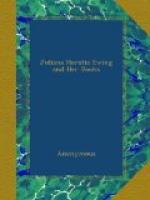If they are very young or backward, perhaps before you attempt anything like Church History, you might familiarize them with the Prayer-book services—by making them find the places in their proper rotation—turn quickly to the Psalms for the Day. Make them find the Lessons for the Day, for Holy-days—Collect for the week—Baptism Service. In fact I should advise you to begin so. Say for the first Lesson you take a CHRISTMAS DAY Service—make them look out everything in succession. Ask them what a Collect is—where the Lessons come from—who wrote the Psalms, etc. Make them understand how the Holy Communion is administered—suppose a Baptism—and make them explain—the two Sacraments in the words of the Catechism. (Never mind whether they understand it—one can’t explain everything at once!)
Indeed I strongly advise you to go on this tack for some time.
Say that for the first lesson or two (the above is too advanced) you take the Psalms. Ask them what Book they were taken from, etc.—make them find them for the day, and show them where and how to find the Proper Psalms. In succeeding lessons, if you like, you can explain that the Psalms are translations—and why the Bible and Prayer-book versions are different—show which are the seven Penitential—(the three Morning and three Evening for Ash Wednesday and the 51st). Point out the latter as used as a general confession in the Commination Service—having been written on the occasion of David’s fall. Also the Psalms of Degrees (the most exquisite of all I think!), which were used to be sung as the Jews came up from all parts of the land to Jerusalem—“I was glad when they said unto me,” etc.
Tell them of any Psalms authentically connected with History—and any anecdotes or traditions that you can meet with connected with them. How S. Augustine and his band of missionaries first encountered the King with his choristers carrying the Cross and chanting Psalms to those Gregorians that Gregory (birch in hand!) had taught him in Rome, etc., etc.
I find they like stray anecdotes—and they are pegs to hang things on. (Trevor says that our Blessed Lord is supposed to have repeated the whole of the twenty-second Psalm on the Cross.) The “Hymn” sung before they went out after the Last Supper was a Psalm. (See marginal Bible notes.) You can do no greater kindness than give them an appreciation and interest in that inexhaustible store of “Prayer and Penitence and Praise”—that has put words into the mouth of the whole Church of God from the days of David to the present time, which is used by every Church (however else divided) in common—and rejected by no sect however captious!
Point out what Psalms are used in the course of the services—(like the Venite, etc.)
Don’t be alarmed if the Psalms last you for months! you can’t do better—and you must go over and over unless your bairns are Solomons! Make them understand that they were intended, and are adapted for singing.




